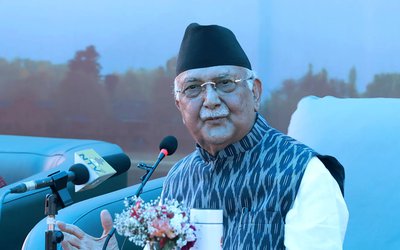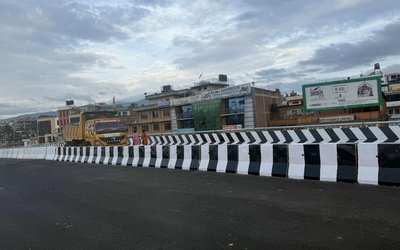More on News




“Who needs the nation state?” asks Harvard University Professor Dani Rodrik in a new paper. He concludes: We all do. His argument is that globalization’s ills stem from the “imbalance between the global nature of markets and the domestic nature of the rules that govern them”, and global governance is neither feasible nor desirable because: market-supporting institutions are not unique; there is a heterogeneity of needs and preferences with regard to institutional forms among communities; geographical distance limits the convergence of those needs and preferences; and experimentation and competition among diverse institutional forms is desirable.
He makes quite a compelling case against what he terms hyper-globalization—which considers globalization as an end in itself rather than as a means to prosperity—just as he did in his book The Globalization Paradox, published last year. And it is difficult to contest his conclusion that all of us need the nation state. However, some of the prescriptions he makes for achieving “smart” globalization, in the paper and/or in the book, should be treated with extreme caution. A careful, in-depth analysis and assessment of their possible implications—which his disciples are wont to ignore—is required.
He recommends that countries be allowed to uphold national standards in labour markets, finance, taxation and other areas, and to do so by raising barriers at the border if necessary, “when international trade and finance demonstrably threaten domestic practices enjoying democratic support”. In The Globalization Paradox, he proposes that the World Trade Organization (WTO)’s Agreement on Safeguards be expanded in scope and converted into an Agreement on Developmental and Social Safeguards, which would provide members, developed and developing alike, the option of opt-outs from WTO obligations even for reasons other than competitive threat to domestic industry. Rodrik’s proposition is that the raising of barriers at the border to uphold national standards should be deemed legitimate only if “democratic process” has been followed. He even goes as far so to argue that authoritarian regimes must not count on getting the same benefits/preferences in the multilateral trading regime, and that such regimes must meet stricter requirements to exercise opt-outs. The emphasis on a democratic process is to guard against the erection of trade barriers at the behest of vested interests which do not represent the interests, values and preferences of the vast majority of the people in a nation.
The fundamental problem with this prescription is how to determine whether the domestic practices under threat “enjoy democratic support”. Even if one were to accept the notion that none (all) of the decisions of an authoritarian (democratic) regime enjoy democratic support—which itself is highly controversial—there still remains a difficult question: how do you judge a regime to be democratic or otherwise? While few would oppose the proposition that governments should take decisions rooted in the interests of the people, there are no universal principles of democracy; nor are there universally accepted indicators or metrics of democracy. It is one thing to use indicators such as the World Bank's World Governance Indicators, including the voice and accountability indicator, in cross-country growth regression or a gravity equation (to explain bilateral trade flows). But few regimes/governments will accept the use of such indicators to judge the legitimacy of their decisions to impose trade barriers. It is also an open question whether democracy should be measured in terms of outcome or process. Some (with the process in mind) might argue that India has a democratic polity because it has universal suffrage and witnesses periodic elections, while others (with the outcome in mind) might argue that a country plagued by rampant corruption, criminalization of politics, a raging insurgency and separatist movements, and where poverty rates are still high, and hunger and undernourishment rates match those in sub-Saharan Africa cannot be considered to be a democracy—at least a functioning one. Similarly, while some might argue that China cannot be considered as a democracy because it is a one-party state and its citizens cannot voice their opinions as freely as their counterparts in the West can, others might argue that if India can be considered a democracy then surely so can China if only for the simple yet incontrovertible fact that it represents the greatest growth and poverty-reduction success story ever (something admitted even by its rabid critics), and that a nation, which boasts the oldest running civilization in the world, should not be expected to have a domestic system of governance that apes Western political values and systems.
Moreover, even if Rodrik’s proposal were to assess the democratic legitimacy of every decision of a regime/government to exercise opt-outs on a case-by-case basis instead of judging a regime/government in its entirety as democratic or authoritarian, the operational difficulties of making such assessments, even if the criteria could be agreed upon, would make the proposal, however noble in intent, a pie in the sky. Forget about India or China—imagine conclusively determining whether the protection afforded by the US government to its cotton farmers carries the support of the overwhelming majority of the American people (unless a referendum is held on the issue!).
Just as standards concerning, say, labour vary across nations, so do ideas of democracy. It is somewhat paradoxical that in attempting to suggest a way to expand and preserve domestic policy space under a multilateral economic system so that nations can uphold their national standards in virtually any area, Rodrik tends to prescribe multilateral harmonization, as it were, of standards in democracy. Moreover, Rodrik’s persistent argument (which can also be found in earlier writings, including the book One Economics Many Recipes) that authoritarian regimes must not count on getting the same benefits/preferences as democratic ones in the multilateral trading regime is an open invitation to trade war or a breakdown of the multilateral trading system. Another issue is that the proposed Agreement on Developmental and Social Safeguards, while prima facie appearing to protect the policy space of developing countries, may in reality have adverse developmental implications for them, particularly the least-developed countries, by making it legal for developed countries to discriminate against imports from countries that do not have, for example, labour standards as their own. That the proposed agreement would also allow poor countries to take border measures to preserve their own national standards would be of poor consolation in the real world of asymmetric political and economic strengths of nations.




